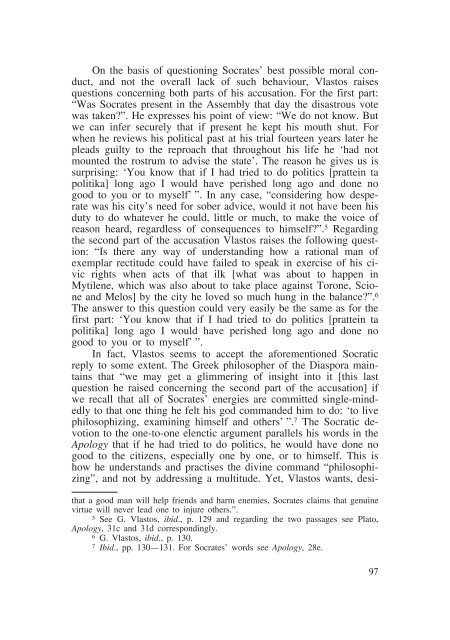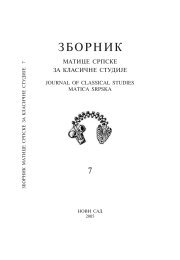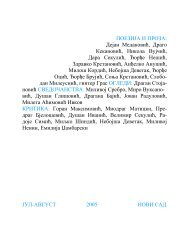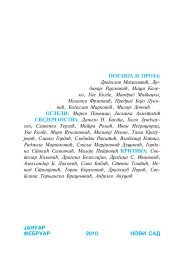You also want an ePaper? Increase the reach of your titles
YUMPU automatically turns print PDFs into web optimized ePapers that Google loves.
On the basis of questioning Socrates' best possible moral conduct,<br />
and not the overall lack of such behaviour, Vlastos raises<br />
questions concerning both parts of his accusation. For the first part:<br />
“Was Socrates present in the Assembly that day the disastrous vote<br />
was taken?". He expresses his point of view: “We do not know. But<br />
we can infer securely that if present he kept his mouth shut. For<br />
when he reviews his political past at his trial fourteen years later he<br />
pleads guilty to the reproach that throughout his life he ‘had not<br />
mounted the rostrum to advise the state'. The reason he gives us is<br />
surprising: ‘You know that if I had tried to do politics [prattein ta<br />
politika] long ago I would have perished long ago and done no<br />
good to you or to myself' ". In any case, “considering how desperate<br />
was his city's need for sober advice, would it not have been his<br />
duty to do whatever he could, little or much, to make the voice of<br />
reason heard, regardless of consequences to himself?". 5 Regarding<br />
the second part of the accusation Vlastos raises the following question:<br />
“Is there any way of understanding how a rational man of<br />
exemplar rectitude could have failed to speak in exercise of his civic<br />
rights when acts of that ilk [what was about to happen in<br />
Mytilene, which was also about to take place against Torone, Scione<br />
and Melos] by the city he loved so much hung in the balance?". 6<br />
The answer to this question could very easily be the same as for the<br />
first part: ‘You know that if I had tried to do politics [prattein ta<br />
politika] long ago I would have perished long ago and done no<br />
good to you or to myself' ".<br />
In fact, Vlastos seems to accept the aforementioned Socratic<br />
reply to some extent. The Greek philosopher of the Diaspora maintains<br />
that “we may get a glimmering of insight into it [this last<br />
question he raised concerning the second part of the accusation] if<br />
we recall that all of Socrates' energies are committed single-mindedly<br />
to that one thing he felt his god commanded him to do: ‘to live<br />
philosophizing, examining himself and others' ". 7 The Socratic devotion<br />
to the one-to-one elenctic argument parallels his words in the<br />
Apology that if he had tried to do politics, he would have done no<br />
good to the citizens, especially one by one, or to himself. This is<br />
how he understands and practises the divine command “philosophizing",<br />
and not by addressing a multitude. Yet, Vlastos wants, desi-<br />
that a good man will help friends and harm enemies, Socrates claims that genuine<br />
virtue will never lead one to injure others.".<br />
5 See G. Vlastos, ibid., p. 129 and regarding the two passages see Plato,<br />
Apology, 31c and 31d correspondingly.<br />
6 G. Vlastos, ibid., p. 130.<br />
7 Ibid., pp. 130—131. For Socrates' words see Apology, 28e.<br />
97

















